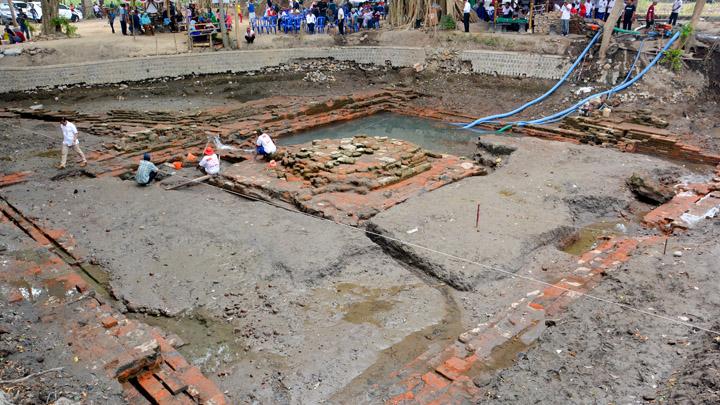
TEMPO.CO, Jakarta - Sukma Indra Mawansah squatted on the five-meter-wide street, a penapak (stick) in her hands, ready to make a strike with one end of it. The 35-year-old women was preparing to strike one of the five logos--balls made of coconut shell, 15 centimeters in diameter--arranged in a line about two meters before her. As a friend gave the signal, Sukma quickly swung at one of the logos with the end of the penapak.
Her first hit missed the target, but her second managed to strike one logo. Her opponent, 30-year-old Fitriadi, not wanting to lose, attempted to knock down the rest of the logos. A bunch of children watching the game, known as balogo, yelled and shouted, making quite a commotion in the Pendamai Alley in Telawang.
Not too far away, five children could be seen playing basamsaman--hopscotch. They did the basiun, bags-I, thrusting open and closed fists in a circle center to determine who takes the first turn. To play the game, the players draw a row of squares on the ground with colored chalk, in a T formation. The topmost square has a rounded out half-circle ceiling.
To start, a player throws the undas, a piece of wood or a flat pebble, into one of the squares. Syifa got first turn. Hopping on one leg, the little girl hopped into each square while skipping over the one with the undas in it. "I love this game," she said.
The eight-year-old has only become acquainted with this age-old game within the past year, after one of her neighbors, M. Suryani, re-introduced it to the Banjar--the indigenous people of South Kalimantan. One of the alleyways in the village has been allocated as the neighborhood playground. Every afternoon on weekends and holidays, dozens of children, teens, and even adults can be seen playing together. Some play basamsaman, while others play balogo, bagasing (spin the top), bakarat, or baduku.
Suryani established the South Kalimantan Pendamai Village community for Traditional Games, to make for a better organized movement. Suryani, who by day works in a shipping company, was concerned that many children in the area had no inkling about southern Kalimantan's local games. The boys in the neighborhood preferred to loaf around at home with their gadgets, instead of being sociable with their chums. "Yet, traditional games are engaging and highly enjoyable to play," said Suryani.
Another group of people with similar aspirations is the Playplus Banjar group. Now under Rizky Akbar's leadership, the group was established in 2013 as part of Playplus Indonesia, which has branches in Yogyakarta, Banda Aceh, Mataram (West Nusa Tenggara), Pare-pare (South Sulawesi) and Ambon (Maluku).
While Pendamai villagers play in an alleyway, the Playplus Banjar has gotten locals to play their games at the Pierre Tendean Pandang Siring Tower, and also in school playgrounds. Playplus Banjar has volunteers made up of students, teachers and high schoolers who get together once a month. "We selected Sunday mornings and afternoons because that's when the Pandang Siring Tower is packed with visitors," said Rizky.
Rizky related how he and his college friends decided to found the Playplus Banjar, as they anxiously noted how the neighborhood children were increasingly becoming addicted to their gadgets. Children were no longer playing in groups. Worse, traditional games were becoming a thing of the forgotten past as parents preferred for their children not to play outside.
"Yet most games have to be played outside the house," said the English major at the Lambung Mangkurat University.
Before kicking off his idea, Suryani did research on how the old games used to be played, and put together the necessary equipment. For the project, he joined forces with Fitriadi, a firefighter. The two began to craft the various wooden pieces needed, such as penapak, balogo, undas, pandakuan, catuk kepala haruan and spinning tops. As if to prove just how serious he was, Suryani dug deep into his own pocket for the project.
When things were ready, Suryani paid courtesy calls around the neighborhood. He chatted up the locals about how important it was to revive the old games as part of their cultural heritage, also to impart in children such values as being good sports, having sociability, maintaining friendships, and being agile and having dexterity. "Traditional games have all these positive things," he said.
Parents, it turned out, were enthusiastic, especially because these games cost next to nothing, and only required their time and energy. The playground also happened to be very close to all their homes.
And so, as of last year, Suryani and Fitriadi started showing the neighborhood kids how the games are played. Parents, some of whom remembered the games from their own childhood, also joined and started playing with other adults.
"Teaching children the games turned out to be easy," said Suryani























